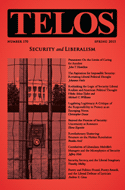 When Edward Snowden, on June 9, 2013, revealed his identity in a video interview posted on the website of the Guardian, he invoked the intellectual framework of liberalism in order to explain why he had leaked a massive trove of secret documents about the spying and data collection practices of the National Security Administration (NSA) and its partner agencies. Having regularly witnessed the legal abuses of the NSA as a technical assistant for the CIA and, subsequently, as an employee of the defense contractor Booz Allen Hamilton, Snowden explained that “over time [the] awareness of wrongdoing builds up and you feel compelled to talk about it . . . until eventually you realize that these things need to be determined by the public, not by somebody who’s simply hired by the government.” When Edward Snowden, on June 9, 2013, revealed his identity in a video interview posted on the website of the Guardian, he invoked the intellectual framework of liberalism in order to explain why he had leaked a massive trove of secret documents about the spying and data collection practices of the National Security Administration (NSA) and its partner agencies. Having regularly witnessed the legal abuses of the NSA as a technical assistant for the CIA and, subsequently, as an employee of the defense contractor Booz Allen Hamilton, Snowden explained that “over time [the] awareness of wrongdoing builds up and you feel compelled to talk about it . . . until eventually you realize that these things need to be determined by the public, not by somebody who’s simply hired by the government.”
Continue reading →
By Johannes Grow · Tuesday, June 3, 2014 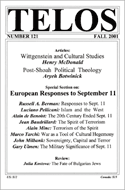 The terrorist attacks on 9/11 created a chain of events that has led not only to the “othering” of Islam and its followers, but also to an increase in the securitization of society as a whole. In “Sovereignty, Empire, Capital, and Terror,” John Milbank examines the aftermath of the 9/11 terrorist attacks, notably the wars in Iraq and Afghanistan and the increasing intervention of governments into the privacy of their respective populations. He questions the wars and the increasingly illiberal turn by the government in regards to dealing with terrorists and criminals and the elimination of due process and, in some cases, habeus corpus. He writes that, “the question that one should ask in response to the immediate aftermath the events of September 11 is why there was outrage on such a gigantic scale” (146). He goes on to identify two reasons: first, the threat against the sovereign, and second, the increasing legitimization by Western governments to intervene in so-called “rogue or failed states,” to ensure the spread of the neoliberal market and prevent the defection of these states from the Western dominated capitalist system. Although there are indeed questions concerning the delineation between national security and the democratic process, the answers to these questions are harder to come by. The terrorist attacks on 9/11 created a chain of events that has led not only to the “othering” of Islam and its followers, but also to an increase in the securitization of society as a whole. In “Sovereignty, Empire, Capital, and Terror,” John Milbank examines the aftermath of the 9/11 terrorist attacks, notably the wars in Iraq and Afghanistan and the increasing intervention of governments into the privacy of their respective populations. He questions the wars and the increasingly illiberal turn by the government in regards to dealing with terrorists and criminals and the elimination of due process and, in some cases, habeus corpus. He writes that, “the question that one should ask in response to the immediate aftermath the events of September 11 is why there was outrage on such a gigantic scale” (146). He goes on to identify two reasons: first, the threat against the sovereign, and second, the increasing legitimization by Western governments to intervene in so-called “rogue or failed states,” to ensure the spread of the neoliberal market and prevent the defection of these states from the Western dominated capitalist system. Although there are indeed questions concerning the delineation between national security and the democratic process, the answers to these questions are harder to come by.
Continue reading →
By Johannes Grow · Tuesday, November 19, 2013 As an occasional feature on TELOSscope, we highlight a past Telos article whose critical insights continue to illuminate our thinking and challenge our assumptions. Today, Johannes Grow looks at Russell A. Berman’s “Saddam and Hitler: Rethinking Totalitarianism” from Telos 125 (Fall 2002).
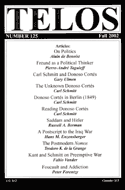 In “Saddam and Hitler: Rethinking Totalitarianism,” Russell A. Berman examines the limits of current efforts to understand totalitarianism in light of the juxtaposition of Nazi Germany and Baathist Iraq. He questions the “cultural approaches” often implemented when approaching the study of the Nazi years. Berman doubts whether the German people, under the increasingly violent and fanatical Nazi regime, were truly a Volksgemeinschaft, a happy population believing in every word of the leader, be it true or false, or as the Baathist regime in Iraq demonstrated, a regime of violence, with the party and the leader as the center node propagating terror throughout the state. The author examines three problems present in contemporary discussions of the Nazi regime that may be further elucidated through a juxtaposition of Hitler’s “movement” with the old Saddam regime. The first involves the futility of defining these regimes as either “Left” or “Right.” These types of distinctions do not allow for a full exploration of the effects of these regimes. The second problem is the aligning of Nazism with a sort of “cultural hegemony” rather than with an environment of coercion, violence, and politics. The third concern involves limiting the question of totalitarianism to a certain period history rather than examining its effects on the present. In “Saddam and Hitler: Rethinking Totalitarianism,” Russell A. Berman examines the limits of current efforts to understand totalitarianism in light of the juxtaposition of Nazi Germany and Baathist Iraq. He questions the “cultural approaches” often implemented when approaching the study of the Nazi years. Berman doubts whether the German people, under the increasingly violent and fanatical Nazi regime, were truly a Volksgemeinschaft, a happy population believing in every word of the leader, be it true or false, or as the Baathist regime in Iraq demonstrated, a regime of violence, with the party and the leader as the center node propagating terror throughout the state. The author examines three problems present in contemporary discussions of the Nazi regime that may be further elucidated through a juxtaposition of Hitler’s “movement” with the old Saddam regime. The first involves the futility of defining these regimes as either “Left” or “Right.” These types of distinctions do not allow for a full exploration of the effects of these regimes. The second problem is the aligning of Nazism with a sort of “cultural hegemony” rather than with an environment of coercion, violence, and politics. The third concern involves limiting the question of totalitarianism to a certain period history rather than examining its effects on the present.
Continue reading →
By Yonathan Listik · Tuesday, January 29, 2013 As an occasional feature on TELOSscope, we highlight a past Telos article whose critical insights continue to illuminate our thinking and challenge our assumptions. Today, Yonathan Listik looks Norbert Elias’s “Civilization and Violence: On the State Monopoly of Physical Violence and its Infringements,” from Telos 54 (Winter 1982).
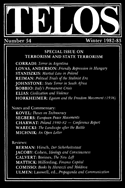 Norbert Elias’s argument in “Civilization and Violence: On the State Monopoly of Physical Violence and its Infringements” is especially helpful for understanding the developments of terrorism, and it also applies to contemporary phenomena such as the war on drugs. He contends that placing the monopoly of violence in the hands of the state comes from a desire of harmonization. The assumption is that stability depends on an imposed self-discipline. That is, the state represents the interests of the collective and should provide for it. This is very enlightening considering the assumptions in the “war on drugs.” Norbert Elias’s argument in “Civilization and Violence: On the State Monopoly of Physical Violence and its Infringements” is especially helpful for understanding the developments of terrorism, and it also applies to contemporary phenomena such as the war on drugs. He contends that placing the monopoly of violence in the hands of the state comes from a desire of harmonization. The assumption is that stability depends on an imposed self-discipline. That is, the state represents the interests of the collective and should provide for it. This is very enlightening considering the assumptions in the “war on drugs.”
Continue reading →
By Timothy Stacey · Tuesday, February 1, 2011 A longer version of this essay was presented at the 2011 Telos Conference, “Rituals of Exchange and States of Exception: Continuity and Crisis in Politics and Economics.”
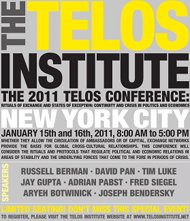 The term “Excellence Critique” connotes a broad array of thinkers, including but not limited to Alisdair MacIntyre, Charles Taylor, Stanley Hauerwas, John Milbank, and Robert Spaemann.[1] While there are clear problems lumping these thinkers together, they share some important qualities. Two such qualities I shall discuss here. The term “Excellence Critique” connotes a broad array of thinkers, including but not limited to Alisdair MacIntyre, Charles Taylor, Stanley Hauerwas, John Milbank, and Robert Spaemann.[1] While there are clear problems lumping these thinkers together, they share some important qualities. Two such qualities I shall discuss here.
First, none of these thinkers deny the successes of liberalism. All agree that liberalism generates the most “wealth” and “freedom” when these terms are measured via monetary success and moral relativism, respectively. Their argument is not one of efficiency; it is one of excellence. Liberalism, according to these thinkers, fails to fully embrace human flourishing. One way of understanding this failure, I will suggest, is via liberalism’s teleological deficit. By teleology I intend a shared, transcendental, and ineffable conception of the good.
Continue reading →
By Russell A. Berman · Saturday, December 29, 2007 Telos 141: Nature and Terror is available in our store.
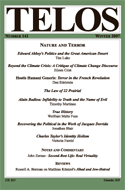 Classical figures of thought endure. A long-standing image of the health of nature contrasts the bucolic landscape with the corruption of the city, where violence abounds. The only security is a natural way of life, far from the brutal metropolis—until nature turns out to be a threat, and we succumb to the uncontrollable fear named for that destructive god: panic. The state of nature is the homeland of violence, its only law the law of the jungle, as we scurry back to the city to find security—until it morphs into the security state. Critical Theory described this dynamic as a sometimes too narrow narrative of domination: the human mastery of nature, in the interest of self-preservation, turns into the mastery of humanity by an encompassing machinery of control. This is an old story, but it comes to us anew in this political season, in which nature and terror—the anxieties about the environment and fear of terrorism, as well as the reaction to it—haunt us, in public and in private. Classical figures of thought endure. A long-standing image of the health of nature contrasts the bucolic landscape with the corruption of the city, where violence abounds. The only security is a natural way of life, far from the brutal metropolis—until nature turns out to be a threat, and we succumb to the uncontrollable fear named for that destructive god: panic. The state of nature is the homeland of violence, its only law the law of the jungle, as we scurry back to the city to find security—until it morphs into the security state. Critical Theory described this dynamic as a sometimes too narrow narrative of domination: the human mastery of nature, in the interest of self-preservation, turns into the mastery of humanity by an encompassing machinery of control. This is an old story, but it comes to us anew in this political season, in which nature and terror—the anxieties about the environment and fear of terrorism, as well as the reaction to it—haunt us, in public and in private.
Continue reading →
|
|
 When Edward Snowden, on June 9, 2013, revealed his identity in a video interview posted on the website of the Guardian, he invoked the intellectual framework of liberalism in order to explain why he had leaked a massive trove of secret documents about the spying and data collection practices of the National Security Administration (NSA) and its partner agencies. Having regularly witnessed the legal abuses of the NSA as a technical assistant for the CIA and, subsequently, as an employee of the defense contractor Booz Allen Hamilton, Snowden explained that “over time [the] awareness of wrongdoing builds up and you feel compelled to talk about it . . . until eventually you realize that these things need to be determined by the public, not by somebody who’s simply hired by the government.”
When Edward Snowden, on June 9, 2013, revealed his identity in a video interview posted on the website of the Guardian, he invoked the intellectual framework of liberalism in order to explain why he had leaked a massive trove of secret documents about the spying and data collection practices of the National Security Administration (NSA) and its partner agencies. Having regularly witnessed the legal abuses of the NSA as a technical assistant for the CIA and, subsequently, as an employee of the defense contractor Booz Allen Hamilton, Snowden explained that “over time [the] awareness of wrongdoing builds up and you feel compelled to talk about it . . . until eventually you realize that these things need to be determined by the public, not by somebody who’s simply hired by the government.”  The terrorist attacks on 9/11 created a chain of events that has led not only to the “othering” of Islam and its followers, but also to an increase in the securitization of society as a whole. In “Sovereignty, Empire, Capital, and Terror,” John Milbank examines the aftermath of the 9/11 terrorist attacks, notably the wars in Iraq and Afghanistan and the increasing intervention of governments into the privacy of their respective populations. He questions the wars and the increasingly illiberal turn by the government in regards to dealing with terrorists and criminals and the elimination of due process and, in some cases, habeus corpus. He writes that, “the question that one should ask in response to the immediate aftermath the events of September 11 is why there was outrage on such a gigantic scale” (146). He goes on to identify two reasons: first, the threat against the sovereign, and second, the increasing legitimization by Western governments to intervene in so-called “rogue or failed states,” to ensure the spread of the neoliberal market and prevent the defection of these states from the Western dominated capitalist system. Although there are indeed questions concerning the delineation between national security and the democratic process, the answers to these questions are harder to come by.
The terrorist attacks on 9/11 created a chain of events that has led not only to the “othering” of Islam and its followers, but also to an increase in the securitization of society as a whole. In “Sovereignty, Empire, Capital, and Terror,” John Milbank examines the aftermath of the 9/11 terrorist attacks, notably the wars in Iraq and Afghanistan and the increasing intervention of governments into the privacy of their respective populations. He questions the wars and the increasingly illiberal turn by the government in regards to dealing with terrorists and criminals and the elimination of due process and, in some cases, habeus corpus. He writes that, “the question that one should ask in response to the immediate aftermath the events of September 11 is why there was outrage on such a gigantic scale” (146). He goes on to identify two reasons: first, the threat against the sovereign, and second, the increasing legitimization by Western governments to intervene in so-called “rogue or failed states,” to ensure the spread of the neoliberal market and prevent the defection of these states from the Western dominated capitalist system. Although there are indeed questions concerning the delineation between national security and the democratic process, the answers to these questions are harder to come by.  In “Saddam and Hitler: Rethinking Totalitarianism,” Russell A. Berman examines the limits of current efforts to understand totalitarianism in light of the juxtaposition of Nazi Germany and Baathist Iraq. He questions the “cultural approaches” often implemented when approaching the study of the Nazi years. Berman doubts whether the German people, under the increasingly violent and fanatical Nazi regime, were truly a Volksgemeinschaft, a happy population believing in every word of the leader, be it true or false, or as the Baathist regime in Iraq demonstrated, a regime of violence, with the party and the leader as the center node propagating terror throughout the state. The author examines three problems present in contemporary discussions of the Nazi regime that may be further elucidated through a juxtaposition of Hitler’s “movement” with the old Saddam regime. The first involves the futility of defining these regimes as either “Left” or “Right.” These types of distinctions do not allow for a full exploration of the effects of these regimes. The second problem is the aligning of Nazism with a sort of “cultural hegemony” rather than with an environment of coercion, violence, and politics. The third concern involves limiting the question of totalitarianism to a certain period history rather than examining its effects on the present.
In “Saddam and Hitler: Rethinking Totalitarianism,” Russell A. Berman examines the limits of current efforts to understand totalitarianism in light of the juxtaposition of Nazi Germany and Baathist Iraq. He questions the “cultural approaches” often implemented when approaching the study of the Nazi years. Berman doubts whether the German people, under the increasingly violent and fanatical Nazi regime, were truly a Volksgemeinschaft, a happy population believing in every word of the leader, be it true or false, or as the Baathist regime in Iraq demonstrated, a regime of violence, with the party and the leader as the center node propagating terror throughout the state. The author examines three problems present in contemporary discussions of the Nazi regime that may be further elucidated through a juxtaposition of Hitler’s “movement” with the old Saddam regime. The first involves the futility of defining these regimes as either “Left” or “Right.” These types of distinctions do not allow for a full exploration of the effects of these regimes. The second problem is the aligning of Nazism with a sort of “cultural hegemony” rather than with an environment of coercion, violence, and politics. The third concern involves limiting the question of totalitarianism to a certain period history rather than examining its effects on the present.  Norbert Elias’s argument in “Civilization and Violence: On the State Monopoly of Physical Violence and its Infringements” is especially helpful for understanding the developments of terrorism, and it also applies to contemporary phenomena such as the war on drugs. He contends that placing the monopoly of violence in the hands of the state comes from a desire of harmonization. The assumption is that stability depends on an imposed self-discipline. That is, the state represents the interests of the collective and should provide for it. This is very enlightening considering the assumptions in the “war on drugs.”
Norbert Elias’s argument in “Civilization and Violence: On the State Monopoly of Physical Violence and its Infringements” is especially helpful for understanding the developments of terrorism, and it also applies to contemporary phenomena such as the war on drugs. He contends that placing the monopoly of violence in the hands of the state comes from a desire of harmonization. The assumption is that stability depends on an imposed self-discipline. That is, the state represents the interests of the collective and should provide for it. This is very enlightening considering the assumptions in the “war on drugs.”  The term “Excellence Critique” connotes a broad array of thinkers, including but not limited to Alisdair MacIntyre, Charles Taylor, Stanley Hauerwas, John Milbank, and Robert Spaemann.[1] While there are clear problems lumping these thinkers together, they share some important qualities. Two such qualities I shall discuss here.
The term “Excellence Critique” connotes a broad array of thinkers, including but not limited to Alisdair MacIntyre, Charles Taylor, Stanley Hauerwas, John Milbank, and Robert Spaemann.[1] While there are clear problems lumping these thinkers together, they share some important qualities. Two such qualities I shall discuss here.  Classical figures of thought endure. A long-standing image of the health of nature contrasts the bucolic landscape with the corruption of the city, where violence abounds. The only security is a natural way of life, far from the brutal metropolis—until nature turns out to be a threat, and we succumb to the uncontrollable fear named for that destructive god: panic. The state of nature is the homeland of violence, its only law the law of the jungle, as we scurry back to the city to find security—until it morphs into the security state. Critical Theory described this dynamic as a sometimes too narrow narrative of domination: the human mastery of nature, in the interest of self-preservation, turns into the mastery of humanity by an encompassing machinery of control. This is an old story, but it comes to us anew in this political season, in which nature and terror—the anxieties about the environment and fear of terrorism, as well as the reaction to it—haunt us, in public and in private.
Classical figures of thought endure. A long-standing image of the health of nature contrasts the bucolic landscape with the corruption of the city, where violence abounds. The only security is a natural way of life, far from the brutal metropolis—until nature turns out to be a threat, and we succumb to the uncontrollable fear named for that destructive god: panic. The state of nature is the homeland of violence, its only law the law of the jungle, as we scurry back to the city to find security—until it morphs into the security state. Critical Theory described this dynamic as a sometimes too narrow narrative of domination: the human mastery of nature, in the interest of self-preservation, turns into the mastery of humanity by an encompassing machinery of control. This is an old story, but it comes to us anew in this political season, in which nature and terror—the anxieties about the environment and fear of terrorism, as well as the reaction to it—haunt us, in public and in private. 

